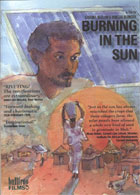
Burning in the Sun 2010
Distributed by Bullfrog Films, PO Box 149, Oley, PA 19547; 800-543-FROG (3764)
Produced by Cambria Matlow and Morgan Robinson and Birdgirl Productions
Directed by Cambria Matlow and Morgan Robinson
DVD, color, 83 min. and 22 min., English, Bambara, and French with subtitles
High School - General Adult
African studies, Anthropology, Area studies, Economics, Education, Energy, Engineering, Environmental Studies, Geography, History, Human Rights, International Relations, Law, Post Colonialism, Science, Technology
Date Entered: 07/08/2011
Reviewed by Jason R. Harshman, The Ohio State UniversityDaniel Dembélé brings hope, inspiration, and electricity to the people of Mali in the award winning documentary, Burning in the Sun. Raised by an Italian mother, Loriana Dembélé who oversees the building of water wells throughout the birth country of her husband who passed away 24 years earlier, Daniel is determined to harness a seemingly endless supply of sun by building and installing solar panels in and around Bamako, the capital of Mali.
Daniel’s belief that Malians deserve and can be provided with cheap energy in order to work, learn, and improve their country is a driving force throughout the entire film. Daniel teams with and learns from Dr. Richard Komp of Practical Small Projects, a U.S. based non-profit organization, how to build the first ever solar panels created in Mali. Daniel and Dr. Komp then set out to teach Daniel’s friends, local farmers, and others interested in the project how to construct panels from broken solar cells that have been sold cheaply to the organization from companies such as British Petroleum (BP) and Shell Oil. Part business plan and part “how-to” video, Burning in the Sun reflects the potential for positive change that comes when people cooperate and put aside personal profit for more altruistic ends such as installing electricity for the 600 students who attend the school in the village of Banko.
The film addresses essential questions to consider in relation to the needs of people not only in Mali but in many areas of the world regarding energy needs: What happens when consumers are turned into producers? If one person teaches another person how an electrical conductor works and then they teach another, what will the result be? And, what happens when instead of relying on international or national governing agencies to fix local problems, the local people learn how to do it themselves? This film teaches viewers not only about the power of education, but that projects dedicated to producing sustainable energy sources, similar to Daniel’s, are possible beyond Mali.
Although the full length version of the film is highly recommended, a shorter 22-minute version is very useful in a classroom setting. The issues, ideas, and people in the film, however, deserve attention beyond whichever version one views as the problems, while lessened, are not completely solved in Bamako, Banko, and elsewhere in Mali. While many citizens of Mali remain without electricity, the film illustrates how access to education increased, consumption of products to promote job growth occurred, and construction of a brighter, sustainable future became possible because one man saw the light.
Awards
- Audience Award, Best Environmental Film, Indie Spirit Film Festival
- Grand Jury Prize, Best EarthVision Environmental Film, Santa Cruz Int'l Film Festival
- Audience Award, DocUtah Film Festival
Winner of 28 awards including: